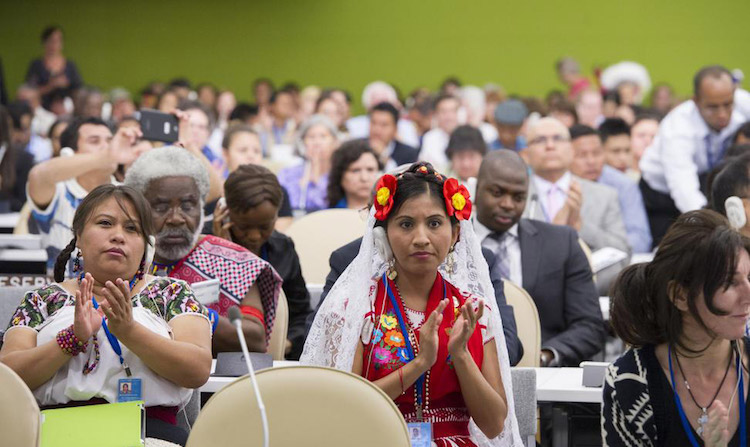By J. Nastranis
NEW YORK (IDN) – The 2030 Agenda for Sustainable Development, and how it relates to indigenous peoples, will feature prominently in discussions at the fifteenth session of the United Nations Permanent Forum on Indigenous Issues.
The Forum will also focus on issues of peace and conflict, often relating to indigenous peoples’ lands, territories and resources and to their rights and distinct identities. More than 1,000 indigenous participants from all regions of the world are attending the gathering at United Nations Headquarters in New York from May 9 to 20.
“Since its establishment, the Permanent Forum has expressed great concern over the continuation of conflicts affecting indigenous peoples in different parts of the world,” said Alvaro Pop, the incoming Chairperson of the UN Permanent Forum on Indigenous Issues.
“We want to draw attention to the particular challenges faced by indigenous peoples in conflict, and the important contributions that indigenous peoples and their traditions and practices can make to conflict prevention and lasting peace.”
‘Indigenous peoples: conflict, peace and resolution’ is the central theme of two interactive panels on May 17. These will identify strategies and concrete measures to prevent conflict and secure peace, and highlight indigenous participation in peace processes such as the contribution of indigenous women, the importance of access to justice and traditional institutions, and the role of indigenous peoples in preventing conflict and securing a just and durable peace.
The Forum will also deliberate on issues related to indigenous youth, health, education, languages, human rights, economic and social development, environment and culture as well as the follow-up to the 2014 World Conference on Indigenous Peoples. The 2030 Agenda for Sustainable Development, and how it relates to indigenous peoples, is also expected to feature prominently in discussions on May 18.
As in the past, there will be dialogues with the Special Rapporteur on the Rights of Indigenous Peoples and the Chair of the Expert Mechanism on the Rights of Indigenous Peoples – the two other UN mechanisms, in addition to the Permanent Forum, specific to indigenous peoples.
Altogether 80 side events – more than ever before – are expected to take place during the two-week session, organized by indigenous peoples’ organizations, UN Member States, UN entities, other intergovernmental organizations, NGOs and other stakeholders.
A cultural event with performances by Sara Curruchich, a Maya singer from Guatemala and SlinCraze, a Sámi rap artist from Norway will take place on May 10 in the Visitors’ Lobby of the United Nations.
Worldwide, there are an estimated 370 million persons belonging to indigenous peoples, living across 90 countries. They make up less than 5 per cent of the world’s population, but account for 15 per cent of the poorest. They speak an overwhelming majority of the world’s estimated 7,000 languages and represent 5,000 different cultures.
The Permanent Forum on Indigenous Issues was established by the UN Economic and Social Council (ECOSOC) in 2000. The Forum provides expert advice and recommendations on indigenous issues to the UN System through ECOSOC; raises awareness and promotes the integration and coordination of relevant activities within the UN System; and disseminates information on indigenous issues.
The Permanent Forum is comprised of 16 independent experts, functioning in their personal capacity. ECOSOC appoints the members, eight of whom are nominated by governments and eight by indigenous organizations from the different regions of the world.
The Forum has gained increasing recognition and impact as the global platform for dialogue, cooperation and concrete action on indigenous peoples, with the UN Declaration on the Rights of Indigenous Peoples as the fundamental framework. [IDN-InDepthNews – 7 May 2016]
IDN is flagship agency of the International Press Syndicate.
Photo: UN Permanent Forum on Indigenous Issues opens its 2014 session at UN Headquarters. UN Photo/Eskinder Debebe
2016 IDN-InDepthNews | Analysis That Matters
Send your comment | Subscribe to IDN newsletter
Follow us on Twitter and Facebook:
http://twitter.com/InDepthNews
http://www.facebook.com/IDN.GoingDeeper

